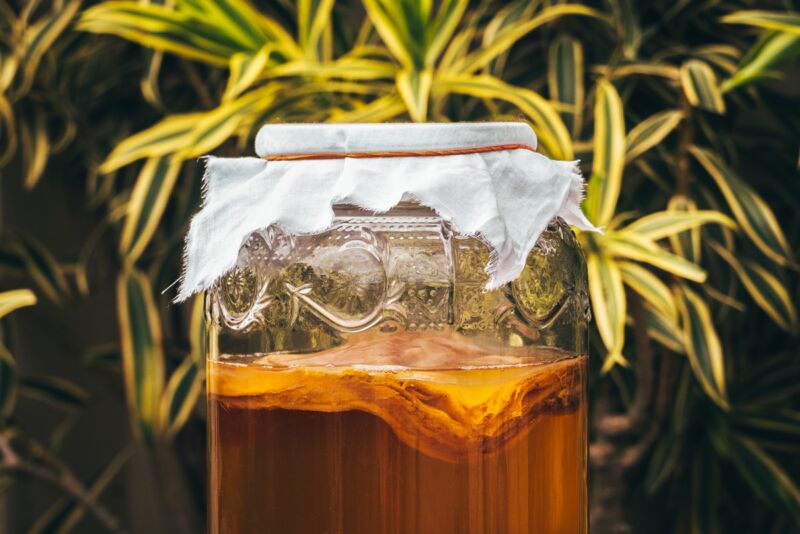
Enlarge / Brewing kombucha tea. Note the trademark gel-like layer of SCOBY (symbiotic culture of bacteria and yeast). (credit: Olga Pankova/Getty Images)
Kombucha tea is all the rage these days as a handy substitute for alcoholic beverages and for its supposed health benefits. The chemistry behind this popular fermented beverage is also inspiring scientists at MIT and Imperial College London to create new kinds of tough “living materials” that could one day be used as biosensors, helping purify water or detect damage to “smart” packing materials, according to a recent paper published in Nature Materials.
You only need three basic ingredients to make kombucha. Just combine tea and sugar with a kombucha culture known as a SCOBY (symbiotic culture of bacteria and yeast), aka the “mother,” also known as a tea mushroom, tea fungus, or a Manchurian mushroom. (It’s believed that kombucha tea originated in Manchuria, China, or possibly Russia.) It’s basically akin to a sourdough starter. A SCOBY is a firm, gel-like collection of cellulose fiber (biofilm), courtesy of the active bacteria in the culture creating the perfect breeding ground for the yeast and bacteria to flourish. Dissolve the sugar in non-chlorinated boiling water, then steep some tea leaves of your choice in the hot sugar water before discarding them.
Once the tea cools, add the SCOBY and pour the whole thing into a sterilized beaker or jar. Then cover the beaker or jar with a paper towel or cheesecloth to keep out insects, let it sit for two to three weeks, and voila! You’ve got your own home-brewed kombucha. A new “daughter” SCOBY will be floating right at the top of the liquid (technically known in this form as a pellicle). But be forewarned: it’s important to avoid contamination during preparation because drinking tainted kombucha can have serious, even fatal, adverse effects. And despite claims that drinking kombucha tea can treat aging, arthritis, cancer, constipation, diabetes, or even AIDS, to date there is no solid scientific evidence to back those claims.





